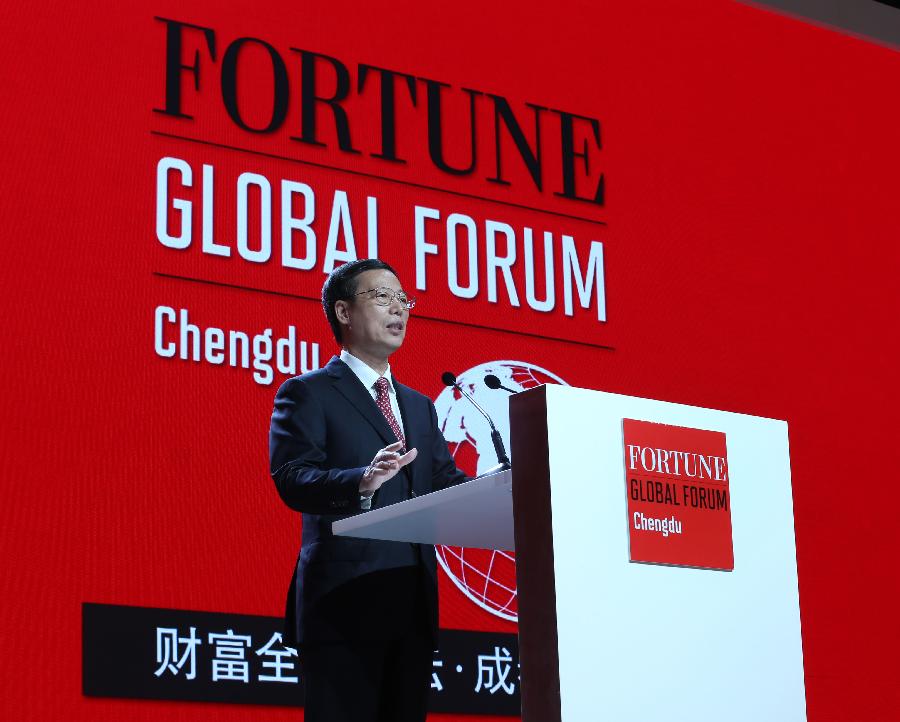


CHENGDU, June 6 (Xinhua) -- China will continue to pursue sustained and healthy economic development by vigorously optimizing its economic structure, Vice Premier Zhang Gaoli said Thursday.
The future of China's economic development is undoubtedly linked with that of the world, Zhang said while giving a keynote speech on the opening night of the 2013 Fortune Global Forum, which is being held from June 6 to 8 in Chengdu, capital of southwest China's Sichuan Province.
Zhang shared China's strategic adjustments and plans for future development in the face of a world economy that is still suffering from destabilizing factors and uncertainties.
"We must always adhere to the idea that development is of overriding importance, as well as endeavor to pursue sustained and healthy economic development," Zhang told a group of business leaders, former government officials, heads of state and economic experts.
"We must never lay undue emphasis on the speed of growth," Zhang said.
Instead, China must ensure steady development and work to solve problems, prevent inflation and keep risks under control, he said, stressing the need to improve the quality and efficiency of development.
China will foster consumption and ensure sustained consumption growth while bringing into play the important role of rational investment, he said.
The country will also lend full support to high-tech, start-up and export-oriented companies, as well as medium- and small-sized companies, he said.
The vice premier also stressed efforts to improve and optimize the country's economic structure.
While speeding up agricultural modernization, the country will also promote the growth of high-tech companies and emerging industries of strategic importance, Zhang said.
Actions will be taken to curb excess capacity and contain the blind expansion of heavily polluting or high energy-consuming enterprises, as well as readjust and optimize inventory stocks, he said.
Zhang said the government will also boost the service sector, especially modern service businesses.
Zhang also emphasized a comprehensive strategy for regional development that is hoped to inject greater vitality into the Chinese economy.
"China's central and western regions provide important strategic space for development, as well as new points of economic growth," Zhang said, vowing to make even greater efforts to press ahead with development in central and west China.
He underlined the importance of turning regional resource advantages into economic strength by developing green, recyclable and low-carbon industries.
Active steps will be carried out to advance urbanization in the regions in order to further boost domestic demand, he said.
Zhang also discussed environmental efforts, saying that the government will work to reduce air pollution, improve soil and water quality and participate in global efforts to mitigate climate change.
People's well-being and the improvement of their material and cultural lives will also be prioritized, Zhang said.
To achieve this end, the government will work to increase household incomes and reform the income distribution system, prioritize employment, create equal access to basic public services and increase the transparency of the legal system, he said.
China will deepen reform and opening up across the board, he said.
Zhang said a new round of reform measures has been unleashed in China, citing 133 items that previously needed central government administrative approval but have been canceled or delegated to lower levels since March.
The country will continue to give more power to the market, society and enterprises, the vice premier said.
In addition, China attaches equal importance to imports and exports and is firmly opposed to protectionism of all forms, he said, adding that continuous efforts will be made to protect the legitimate rights of foreign investors operating in China.
According to Zhang, China had given approval more than 740,000 foreign-invested companies by the end of 2012, with combined direct investment surpassing 1.2 trillion U.S. dollars.
China is expected to import goods worth 10 trillion U.S. dollars over the next five years and invest 500 billion U.S. dollars in foreign countries, he added.
The 2013 Fortune Global Forum is being held in China for the fourth time. Three previous forums were held in Shanghai in 1999, Hong Kong in 2001 and Beijing in 2005, respectively.
 Internal photos of China's aircraft carrier "Liaoning"
Internal photos of China's aircraft carrier "Liaoning" North China Sea Fleet in replenishment training
North China Sea Fleet in replenishment training  Chinese miners in Ghana
Chinese miners in Ghana Sapphire deposits in SW Madagascar
Sapphire deposits in SW Madagascar Investigators hunt for clues to fire
Investigators hunt for clues to fire Countdown to exam day in quake-hit area
Countdown to exam day in quake-hit area Where's the bottom line of eye catching shows?
Where's the bottom line of eye catching shows? Shanghai blackout shuts down metro and elevator
Shanghai blackout shuts down metro and elevator Ming and Qing: Fashionable dynasties
Ming and Qing: Fashionable dynasties 5 free things to do in Hangzhou
5 free things to do in Hangzhou Post-pregnancy photos of gorgeous Athena Chu
Post-pregnancy photos of gorgeous Athena Chu 4D scans show unborn babies' facial expressions
4D scans show unborn babies' facial expressions  Chinese solar firms squeezed by EU duties
Chinese solar firms squeezed by EU duties White collars setting up stalls become popular
White collars setting up stalls become popular Tibet's changes through artworks
Tibet's changes through artworks